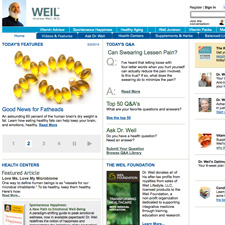Can You Trust Online Health Information?
Can you give me an idea of how accurate and reliable Internet health sites are? Do you think it is worthwhile to learn about symptoms online, or would I be smarter to leave diagnosis to my doctor?
Andrew Weil, M.D. | May 16, 2014

You can trust my website. All of the health information here has been vetted by me or by medical specialists I respect and trust. I believe the same is true for many other health sites, but there are endless exceptions that could lead you in the wrong direction.
You can always get reliable information from the National Institutes of Health (NIH), which has a huge and impressive online presence, and also from nonprofit institutions such as the American Heart Association, the American Cancer Society, as well as websites of major medical centers like the Mayo Clinic. The best rule to follow is "consider the source." If a large and respected medical center or a well-known nonprofit institution maintains the site, you should generally be on safe ground. But if you have any doubt, double check by clicking on the site’s "about us" section. Look for a customer service team or some other way to contact the organization – that information should be available on the website’s landing page. If you can’t find contact information, stay away.
Some other precautions:
- Be sure to look for the author of the information or a copyright attesting to its source. Example: Copyright 2014, American Cancer Society. When you finish reading this, look at the bottom of the page where you’ll see my copyright information.
- Beware of unsigned case histories or testimonials. However persuasive, if these don’t carry the name of a real person who can be contacted, you have no way of knowing whether or not the stories were fabricated.
- Check the credentials of experts contributing to the site. They should be health professionals with expertise in the area of medicine the site deals with. Look for the initials M.D., D.O., R.N., N.D., or Ph.D. after the names.
- Beware of any site that claims a single product will cure a long list of illnesses or an illness generally acknowledged to be incurable, especially if it contains a "secret" ingredient or a "scientific breakthrough," or is purported to be a cure doctors don’t know about. Avoid any link to products or therapies that are "making doctor’s nervous," or that "doctors don’t want you to know about."
- Look for dates on the site’s documents. The health information should be current. For example, you’ll see this article’s "Published" date above.
- The information should be written in clear language, not medical jargon. If you can’t understand it, stay away.
Although you can find clear, current and accurate health information online, if you have a health problem that concerns you, see your doctor. Medical decisions aren’t "one size fits all." Despite all the health information available online, there’s no substitute for a professional who can ask targeted questions, examine you, and order appropriate tests. The Internet certainly allows you to gather medical information, but you may need someone with more training and experience to interpret it as it pertains to you.
Andrew Weil, M.D.









